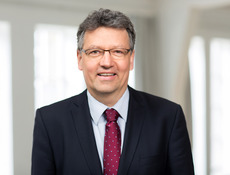
Thomas Kunsch
Lengthy asylum procedures make it more difficult for refugees in Germany to find work
Millions of people around the globe are now refugees. Many make their way to Germany looking for a safe place to live and work. Yet a new study by the Bertelsmann Stiftung shows that the backlog of asylum cases is greater in Germany than in any other EU member state, a situation that makes it much more difficult for refugees to find jobs.
Of all EU member states, Germany is the slowest in processing asylum applications. According to a new Bertelsmann Stiftung study, 221,195 refugees in Germany were still waiting for a final decision on their case at the end of 2014. And that figure has continued to increase – by 10 percent in the first two months of this year, according to the EU statistical agency Eurostat.
"Asylum-seekers and communities are kept on hold for too long," says Jörg Dräger, member of the Bertelsmann Stiftung Executive Board. In 2014, it took an average of 7.1 months for an asylum application to be processed by Germany's Federal Office for Migration and Refugees. For refugees from certain countries, it took considerably longer. Afghanis, for example, had to wait 16.5 months on average and Pakistanis 17.6 months.
The lack of concrete information makes it more difficult for refugees to quickly find employment in the local job market. Yet, as a Bertelsmann Stiftung survey shows, 84 percent of Germans are in favor of immigrants quickly finding work.
Germany trails other European countries in processing asylum applications
In 2014, 202,645 people applied for asylum in Germany. In addition, 134,015 applications from 2013 were still pending. And although the number of refugees coming to Germany is greater than it has been in years, the backlog is not only due to the increased volume. The number of unresolved cases is even lower in Denmark and Sweden, for example, which receive more asylum applications per capita than Germany does. The coalition agreement reached by Germany's current government states that it should take no longer than three months for a decision to be made when someone applies for asylum – a target that the country’s federal authorities missed by a wide margin last year.
“The number of people applying for asylum will, most likely, continue to rise. Policymakers therefore made the right decision when they approved 2,000 new staff positions for the Federal Office for Migration and Refugees during the ‘refugee summit’ held in Berlin in May.”
Jörg Dräger, member of the Bertelsmann Stiftung Executive Board
For Professor Dietrich Thränhardt, migration expert and author of the new Bertelsmann Stiftung study, nothing makes it more difficult for refugees to quickly find work than not knowing how things stand with their asylum application. According to Thränhardt, the current situation and lengthy processing times are unacceptable. Although the federal government has shortened the time asylum-seekers must reside in Germany and are prohibited from working to three months, and although two-thirds of asylum-seekers are of working age, generally they cannot find a job until they have received permission to remain in the country. The situation is too risky for potential employers and the outlook too uncertain for the refugees themselves.
Steps for shortening processing times
The study recommends a series of measures that could get refugees working more quickly. The first step would be to process the current backlog of cases. This would require more staff and better decision-making processes, since 13 percent of all decisions made in 2013 were changed by the courts. In addition, refugees should begin learning German while still waiting for a decision, something that is currently only possible in five German states.
“Taking in refugees is an important humanitarian responsibility. The faster and more successfully they are integrated into the job market, the faster concerns can be overcome that Germany has already reached its limits.”
Jörg Dräger, member of the Bertelsmann Stiftung Executive Board
According to the study, information should also be collected on each refugee’s education, work experience and potential occupations, and then sent to Germany’s Federal Employment Agency. That would allow the agency to begin helping asylum-seekers find work within three months at the latest. If refugees moved from temporary to permanent housing within three months, it would also help them develop contacts in the community that could lead to work or educational opportunities.
The complete study can be found here (only in German):




